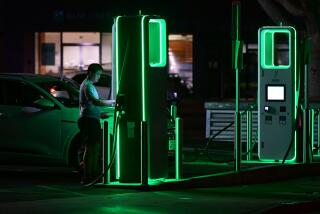Leasing Computers Can Preserve Cash
- Share via
Like many small-business owners, Tony Fung, founder and chief executive of American Cryptronics Corp. in Costa Mesa, rents personal computers to run his business.
But unlike businesses that rent a couple of machines, Fung spends about $5,000 a month renting different models for his engineers to study to develop new add-ons and accessories.
“If we had to buy every one of them, it would cost $20,000 to $30,000 every month,” said Fung, whose company develops 40 to 50 new computer products a year. “It would be very difficult to generate that kind of capital, so for us renting is the only way to go.”
Small-business owners such as Fung are contributing mightily to the growing computer rental business, which is estimated at $500 million a year. Although renting is perfect for short-term needs, including special projects, and for people who want to try out a system before buying one, many business owners turn to lease agreements for long-term needs. Leasing is a growing, multibillion-dollar industry. IBM Credit Corp., for example, reported nearly $5 billion in leasing business in 1990.
The chief advantage of renting or leasing computers is to free up cash for other purposes. Another benefit is that in most cases, the rental or lease payments are fully deductible as a business expense.
Let’s dispel one common misconception about leasing: If you don’t have the cash and the bank won’t make you a loan, don’t count on being able to lease the equipment either. Because leasing is a form of 100% financing, your credit history and financial statements will be carefully scrutinized. In many cases, you will also be asked to personally guarantee the lease payments, even if your business is incorporated.
“Renting and leasing computers is not just for large companies anymore,” said Gary Phillips, senior vice president of Electro Rent Corp. in Van Nuys. “It also benefits small and mid-sized companies that want to preserve their capital equipment budget.”
Phillips said his firm is seeing an increase in orders from project-oriented companies, including architectural, engineering and accounting firms.
If you don’t have a computer wizard on your staff, consider hiring a computer consultant. It will be worth the money to get the right advice. “We define how the business owner wants to use the computer within their business first, then we choose the software and finally the hardware,” said Mel Mitchell, managing director of System Technology Group, a consulting firm in Encino.
“There are two basic types of leases,” said Neil Leddy, a senior account representative for Apple Commercial Credit in Chino Hills. “In a true lease, the customer can buy the equipment, return it or continue leasing it.”
With a “bargain purchase lease,” the customer pays a bit more each month for the option to buy the equipment at the end of the lease, often for as little as $1.
Leddy said a $10,000 computer system, including a high-quality printer, can be leased for about $230 a month. Most commercial lease agreements run three to five years. You should also expect to pay about two months’ payments or a security deposit before the equipment is delivered.
In addition to the monthly payment, the customer is responsible for making sure the equipment is properly insured against damage or theft. You must also pay for any service or maintenance costs and for all sales tax due.
“Equipment leases are not cancelable,” warns Leddy. That means if your business dies, you are still responsible for the lease payments.
When comparing prices, Leddy suggests asking questions to be sure you understand exactly what the agreement covers and if there are any hidden costs including documentation fees. These fees might be as low as $50 to write up the lease, or as high as 2% of the total lease amount. A few years ago, most computer rental firms were mom-and-pop enterprises. Today, big companies, sensing a growth opportunity, have moved into the market. Businessland, believed to be the nation’s largest personal computer retailer, has rental centers in Chicago, Los Angeles and San Francisco and is expanding to the East Coast. GE Rents, an Atlanta-based division of General Electric, rents equipment by the day, week, month or year. PCR Personal Computer Rentals, based in Cranbury, N.J., has 62 franchised locations around the United States.
John Doyle, vice president of marketing for IBM Credit Corp. in Stamford, Conn., said most small businesses are more likely to buy their first, small computer system outright. But as the businesses grow and they need more powerful and expensive computer systems, they are more apt to finance the next step. He advises small-business owners to think ahead and choose a system that can handle their growth requirements over a two or three-year period.
SMART LEASING * Determine what kind of computer system you need before you contact a leasing company.
* Compare the cost of down payments, security deposits and documentation fees.
* Find out whether the lease contains an obsolescence clause and how the company handles requests to upgrade equipment.
* Ask if there are prepayment penalties. It is usually very expensive to pay off the lease early.
* Ask your accountant and your attorney to review everything before you sign any documents. Leases are complex legal agreements.
More to Read
Inside the business of entertainment
The Wide Shot brings you news, analysis and insights on everything from streaming wars to production — and what it all means for the future.
You may occasionally receive promotional content from the Los Angeles Times.










